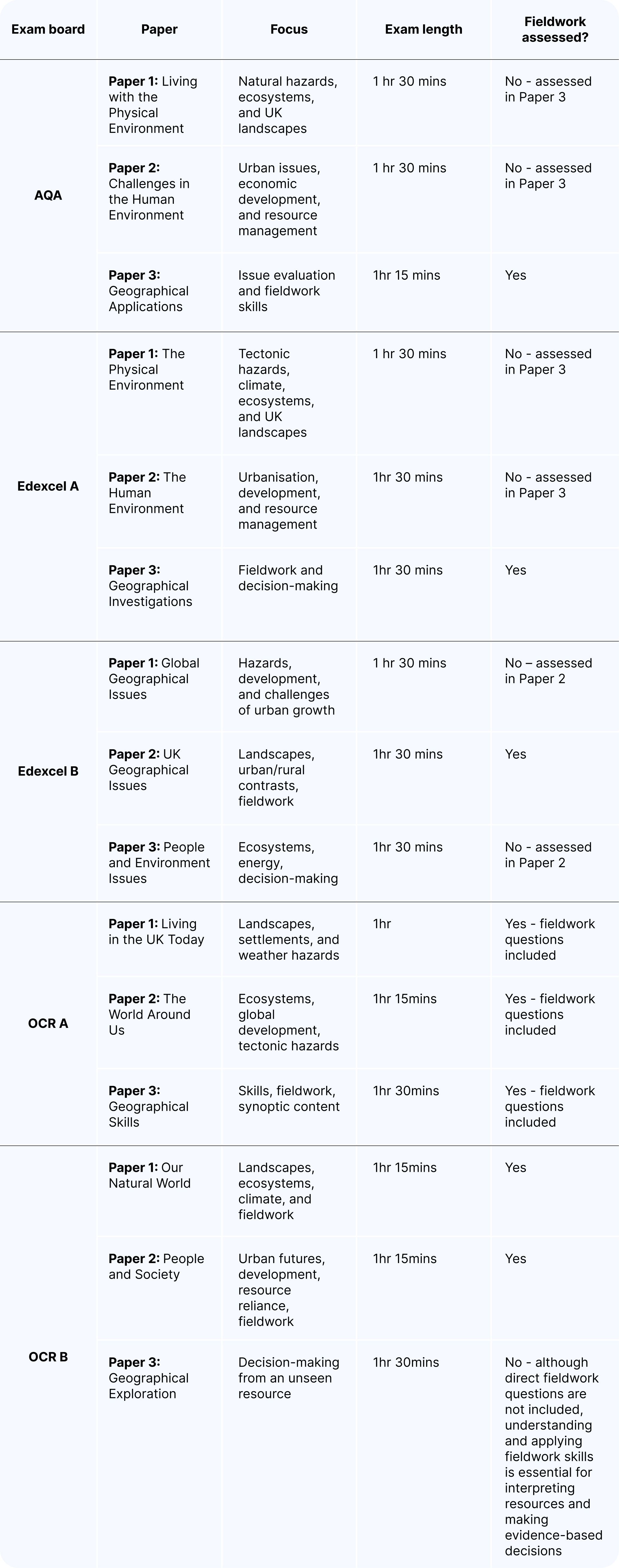GCSE Geography breakdown: topics, learning objectives & sample questions
By Atom | Sep 10, 2025, 3:07 PM
Contents
Geography brings the world into the classroom, helping students understand everything from tectonic plates to urbanisation and climate change. However, with a wide range of topics and case studies, knowing where to begin with GCSE Geography revision can be hard.
In this article, we’ll summarise the key topics across physical and human geography, what students are expected to know, and how to prepare with sample questions.
What this post covers:
Overview of the GCSE Geography specification
Key physical and human geography topics
Core learning objectives
Sample exam questions with tips for success
Why Geography matters for GCSE success
GCSE Geography develops far more than subject knowledge. It strengthens analytical and problem-solving skills by asking students to interpret data, evaluate evidence, and construct clear arguments. These abilities are valuable not just in exams, but across the wider curriculum and in everyday decision-making.
Geography also encourages a deeper awareness of global issues such as climate change, resource use, and urban growth. Understanding these themes helps students connect classroom learning to the real world, making the subject both practical and engaging.
A strong grade in GCSE Geography can also open doors for the future. It provides a solid foundation for A-level subjects like Geography, Sociology, Politics and Environmental Science, while also supporting career pathways in areas such as urban planning, sustainability, international relations, and business.
Exam boards and specification overview

Key topics in physical geography
1. Natural hazards
Types of natural hazards (tectonic, weather-related)
Earthquakes and volcanoes: causes, effects, responses
Weather hazards and climate change
Learning objectives:
Understand the physical processes behind natural hazards
Compare primary and secondary effects
Evaluate how different countries respond to disasters
Sample question:
“Compare the effects of a tectonic hazard in a low-income and a high-income country. (6 marks)”
2. The living world
Ecosystems: structure, nutrient cycles, food webs
Tropical rainforests and hot deserts: characteristics, adaptations, threats
Learning objectives:
Describe and explain how plants and animals adapt
Analyse human impacts on ecosystems
Evaluate management strategies for sustainability
Sample question:
“Explain how plants in hot desert environments are adapted to survive. (4 marks)”
3. Physical landscapes in the UK
Coastal and river landscapes
Erosion, transportation, deposition processes
Landforms and case studies of UK landscapes
Learning objectives:
Identify landforms from maps and diagrams
Explain the formation of features like meanders or headlands
Interpret OS maps and fieldwork data
Sample question:
“Describe the formation of a waterfall. (4 marks)”
Key topics in human geography
1. Urban issues and challenges
Urban growth in LICs/NEEs and HICs
Case studies: megacities, sustainable urban planning
Learning objectives:
Explain causes and consequences of urbanisation
Use evidence to evaluate urban strategies
Interpret population and migration data
Sample question:
“Evaluate the effectiveness of urban planning in improving the quality of life in a LIC/NEE. (6 marks)”
2. The changing economic world
Development indicators and the development gap
Strategies for reducing the development gap
Economic growth in LICs/NEEs and the UK economy
Learning objectives:
Interpret development data
Evaluate different aid and investment strategies
Analyse the impacts of economic change
Sample question:
“Discuss the strategies used to reduce the development gap. (6 marks)”
3. The challenge of resource management
Global inequalities in food, water and energy
Case studies of resource management in the UK
Sustainable solutions to resource challenges
Learning objectives:
Explain the importance of resource supply
Analyse supply and demand data
Evaluate sustainable strategies
Sample question:
“Explain why water insecurity is a global issue. (4 marks)”
Geographical skills and applications
Paper 3 tests students’ ability to interpret resources and apply fieldwork knowledge.
What’s assessed:
Cartographic skills (e.g. maps, graphs, photographs)
Statistical skills (mean, percentage, interpreting trends)
Fieldwork methods and evaluation
Sample question:
“Evaluate the effectiveness of your fieldwork method for collecting river velocity data. (6 marks)”
Top tips:
Practise describing patterns from graphs and maps
Know the difference between primary and secondary data
Be specific when reflecting on methods and limitations
How to revise GCSE Geography effectively
Success in GCSE Geography comes from a combination of secure knowledge, well-chosen examples, and confident use of skills. An effective revision approach will balance learning content with practising applying it in exam conditions.
1. Start with the specification
Use the exam board’s specification as a checklist of what needs to be covered.
Make sure both physical geography and human geography topics are included.
Mark off topics as they are revised to track progress.
2. Organise case study knowledge
For each required case study, note down facts, figures, causes, effects, and responses.
Keep these in one place, such as on flashcards or a revision app for quick review.
Focus on learning details that can be used to back up points in answers.
3. Practise geographical skills
Work regularly with OS maps, graphs, and data sets.
Use past paper questions to practise describing patterns, trends, and relationships.
Review fieldwork techniques, as these are assessed in all exam boards.
4. Use a clear structure for answers
Point – Make a clear statement.
Evidence – Support it with case study data or examples.
Explain – Link the evidence back to the question.
5. Space revision over time
Plan revision in short, focused sessions across several weeks.
Revisit topics at intervals to strengthen long-term memory.
Avoid leaving all preparation to the final few days.
6. Combine different revision methods
Active approaches: past papers, quizzes, teaching content aloud.
Passive approaches: reading notes, watching revision videos, creating mind maps.
A mix of both helps build understanding and recall.
Final thoughts
GCSE Geography is about more than memorising facts; it’s about understanding the world and applying that knowledge. With a clear plan, regular practice, and the right support, students can approach the exam feeling confident and prepared. Consistency and encouragement make all the difference.
Don’t miss Atom’s GCSE giveaway!

Six months. Six epic prizes. Six chances to make the GCSE season unforgettable.
We’re launching Atom for GCSE prep in 2026, and to celebrate, over the next six months, we’re giving away thousands of pounds worth of prizes to help your child level up their GCSE revision.
Here’s a taste of what’s up for grabs:
The latest Apple tech, including an iPad Air, Vision Pro and more
Festival tickets for Boardmasters and Reading 2026
Europe interrail passes and £1,000 spending money
…and that’s just a few of the amazing prizes available.
Our first two winners have already taken home incredible prizes! Find out who they are and what they won in our latest giveaway update and keep an eye out for news of our November winner.
It’s free to join. UK only. Full T&Cs apply.
Contents
